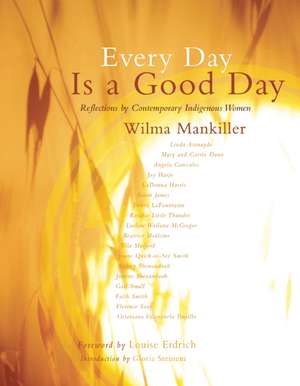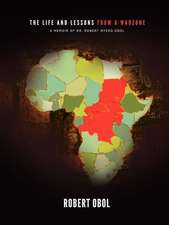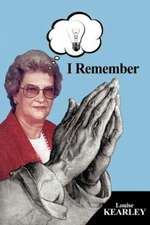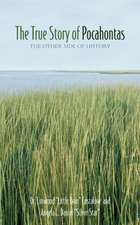Every Day Is a Good Day: Reflections by Contemporary Indigenous Women
Autor Wilma Mankiller Louise Erdich, Vine Jr. Deloriaen Limba Engleză Paperback – 30 apr 2011
Vezi toate premiile Carte premiată
"This is a very important book. It could be the most important of this new century if it were to get the mindfulness it deserves."—Gloria Steinem, from the introduction
In this rare and intimate glimpse at the resilience and perseverance of Native women, twenty indigenous female leaders—educators, healers, attorneys, artists, elders, and activists—come together to discuss issues facing modern Native communities. This illuminating book found its genesis with Wilma Mankiller (1945–2010), first female chief of the Cherokee Nation. Over a period of several years, Mankiller engaged indigenous women in conversation about spirituality, traditions and culture, tribal governance, female role models, love, and community. Their common life experiences, patterns of thought, and shared values gave them the freedom to be frank and open, and a place of community from which to explore powerful influences on Native life.
Wilma Mankiller spent most of her life in the rural community of Mankiller Flats in Adair County, Oklahoma. Her lifetime of activism began in 1969, when she took part in the Native American occupation of Alcatraz Island. She became the first female principal chief of the Cherokee Nation in 1985, a position she held for ten years. Mankiller has been honored with many awards, including the Presidential Medal of Freedom and honorary doctorate degrees from Yale University, Dartmouth College, and Smith College. She passed away April 6, 2010, at her home on the Mankiller family allotment.
In this rare and intimate glimpse at the resilience and perseverance of Native women, twenty indigenous female leaders—educators, healers, attorneys, artists, elders, and activists—come together to discuss issues facing modern Native communities. This illuminating book found its genesis with Wilma Mankiller (1945–2010), first female chief of the Cherokee Nation. Over a period of several years, Mankiller engaged indigenous women in conversation about spirituality, traditions and culture, tribal governance, female role models, love, and community. Their common life experiences, patterns of thought, and shared values gave them the freedom to be frank and open, and a place of community from which to explore powerful influences on Native life.
Wilma Mankiller spent most of her life in the rural community of Mankiller Flats in Adair County, Oklahoma. Her lifetime of activism began in 1969, when she took part in the Native American occupation of Alcatraz Island. She became the first female principal chief of the Cherokee Nation in 1985, a position she held for ten years. Mankiller has been honored with many awards, including the Presidential Medal of Freedom and honorary doctorate degrees from Yale University, Dartmouth College, and Smith College. She passed away April 6, 2010, at her home on the Mankiller family allotment.
Preț: 135.79 lei
Nou
Puncte Express: 204
Preț estimativ în valută:
25.99€ • 27.03$ • 21.45£
25.99€ • 27.03$ • 21.45£
Carte disponibilă
Livrare economică 24 martie-07 aprilie
Preluare comenzi: 021 569.72.76
Specificații
ISBN-13: 9781555916916
ISBN-10: 1555916910
Pagini: 214
Dimensiuni: 178 x 226 x 18 mm
Greutate: 0.54 kg
Ediția:Memorial
Editura: Fulcrum Group
ISBN-10: 1555916910
Pagini: 214
Dimensiuni: 178 x 226 x 18 mm
Greutate: 0.54 kg
Ediția:Memorial
Editura: Fulcrum Group
Recenzii
“The endurance of this book owes as much to these women’s resilience as to the staying power of its author. Although she died in April 2010 at the age of 64, Mankiller had survived and indeed surpassed what might be considered more than her share of misfortune. In The Way Home, the chief, a key player in the rebuilding of her nation, wrote, “The question I am asked most frequently is why I remain such a positive person, after surviving breast cancer, lymphoma, dialysis, two kidney transplants and systemic myasthenia gravis. The answer is simple: I am Cherokee, and I am a woman. No one knows better than I that every day is indeed a good day.” “ —Indian Country Today
“The late Mankiller, the first female chief of the Cherokee Nation, had conversations with 19 indigenous female educators, healers, attorneys, artists, musicians, elders, scientists, and activists over a period of several years, and here, they discuss issues facing modern Native American communities from a woman’s perspective. Through oral history, discussion, vignettes, and stories, they relate how they led meaningful lives by building on positive attributes of their communities and consider such subjects as ceremony, governance, womanhood, love and acceptance, and home and community. This edition has been published in honor of Mankiller’s memory.” —Book News Inc.
“The late Mankiller, the first female chief of the Cherokee Nation, had conversations with 19 indigenous female educators, healers, attorneys, artists, musicians, elders, scientists, and activists over a period of several years, and here, they discuss issues facing modern Native American communities from a woman’s perspective. Through oral history, discussion, vignettes, and stories, they relate how they led meaningful lives by building on positive attributes of their communities and consider such subjects as ceremony, governance, womanhood, love and acceptance, and home and community. This edition has been published in honor of Mankiller’s memory.” —Book News Inc.
Notă biografică
Wilma Mankiller: Wilma Mankiller was an author, activist, and former principal chief of the Cherokee Nation. Her roots were planted deep in the rural community Mankiller Flats in Adair County, Oklahoma, where she spent most of her life. She has been honored with many awards, including the Presidental Medal of Freedom, and has received honorary degrees from such esteemed institutions as Yale University, Dartmouth College, and Smith College. Wilma Mankiller died in 2010 after a long battle with cancer.
Contributors include:
Linda Aranaydo, Muscogee Creek (physician)
Mary and Carrie Dann, Western Shoshone (traditionalists)
Angela Gonzales, Hopi (professor)
Joy Harjo, Muscogee Creek/Cherokee (poet/musician)
LaDonna Harris, Comanche (warrior)
Sarah James, Nee'Tsaii Gwich'in (human rights activist)
Debra LaFountaine, Ojibway (environmentalist)
Rosalie Little Thunder, Lakota (Lakota linguist/artist)
Lurline Wailana McGregor, Native Hawaiian (television producer)
Beatrice Medicine, Lakota (anthropologist)
Ella Mulford, Navajo (biologist)
Jaune Quick-to-See Smith, Salish Flathead (artist)
Audrey Shenandoah, Onondaga (Clan Mother)
Joanne Shenandoah, Oneida (musician)
Gail Small (Head Chief Woman), Northern Cheyenne (environmental activist)
Faith Smith, Ojibway (educator)
Florence Soap, Cherokee (grandmother)
Octaviana Valenzuela Trujillo, Pascua Yaqui (educator)
Contributors include:
Linda Aranaydo, Muscogee Creek (physician)
Mary and Carrie Dann, Western Shoshone (traditionalists)
Angela Gonzales, Hopi (professor)
Joy Harjo, Muscogee Creek/Cherokee (poet/musician)
LaDonna Harris, Comanche (warrior)
Sarah James, Nee'Tsaii Gwich'in (human rights activist)
Debra LaFountaine, Ojibway (environmentalist)
Rosalie Little Thunder, Lakota (Lakota linguist/artist)
Lurline Wailana McGregor, Native Hawaiian (television producer)
Beatrice Medicine, Lakota (anthropologist)
Ella Mulford, Navajo (biologist)
Jaune Quick-to-See Smith, Salish Flathead (artist)
Audrey Shenandoah, Onondaga (Clan Mother)
Joanne Shenandoah, Oneida (musician)
Gail Small (Head Chief Woman), Northern Cheyenne (environmental activist)
Faith Smith, Ojibway (educator)
Florence Soap, Cherokee (grandmother)
Octaviana Valenzuela Trujillo, Pascua Yaqui (educator)
Descriere
A rare and often imtimate glimpse into the lives of Native women who face each day positively.
Premii
- Independent Publisher Book Awards Finalist, 2005

















